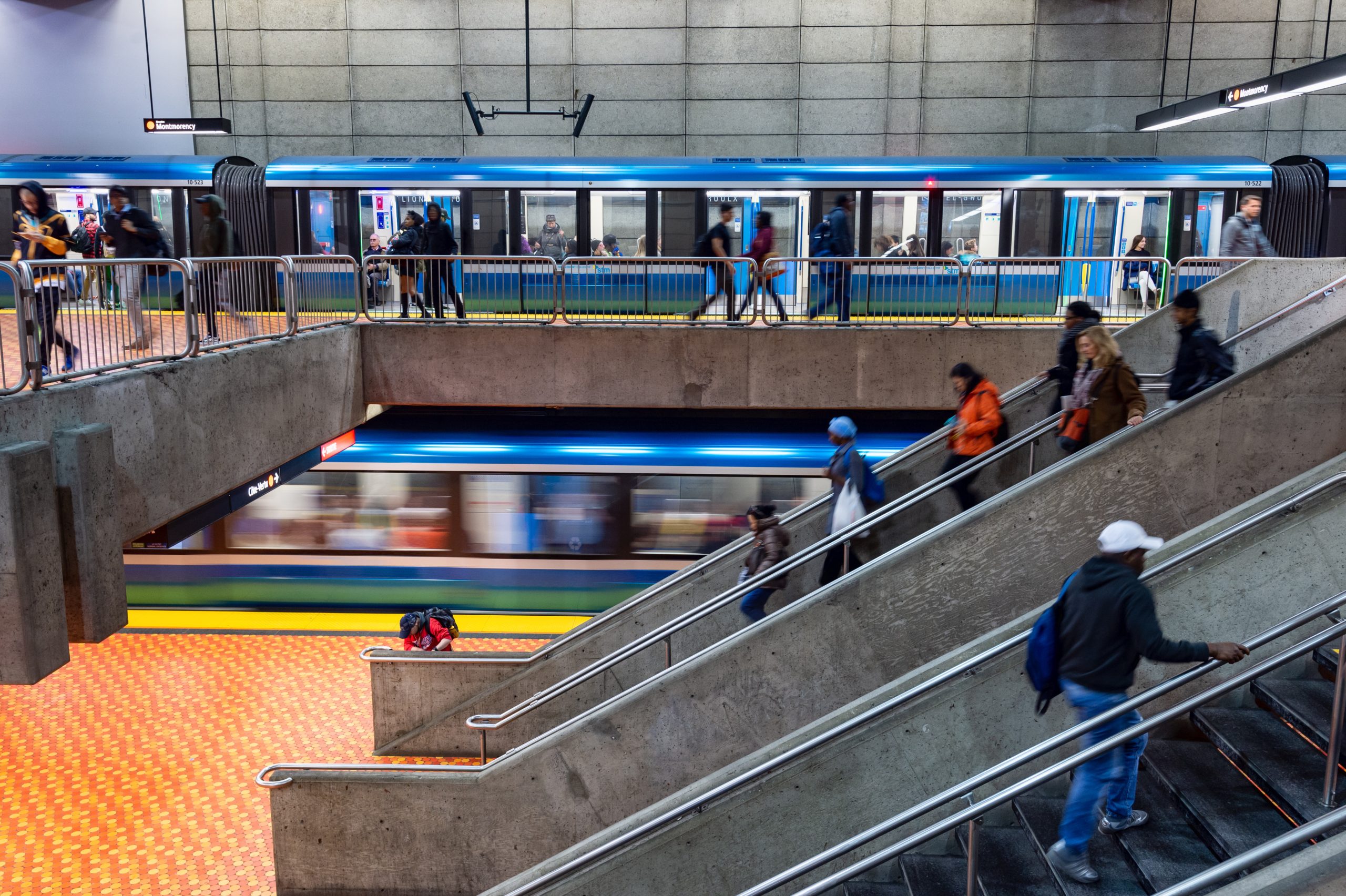Montreal’s transit corporation delivers precisely the kind of meat-and-potatoes service that most legacy transit agencies offer: it manages a 68-station subway network, the construction of which dates back to Quebec’s 1960s nation-building era and operates some 2,000 buses that haul Montrealers over more than 200 routes. Like busy transit operations everywhere, Société de transport de Montréal (STM) is axiomatically good for the climate and the local economy. With average daily ridership of about 1.7 million, STM officials like to say – correctly – that its very existence promotes intensification and allows riders to spend far less of their incomes on getting around than they would by operating a car.
Yet in the transit-friendly annals of Montreal mobility, STM last year was overshadowed by a fresh-faced regional counterpart, the very new light-rail operator known as Réseau express métropolitain (REM). Last summer, VIPs gathered for the ribbon cutting of the first leg of REM’s shiny new LRT network, which is operated by a public–private partnership, will cost $8 billion and will eventually connect the island with its mainland suburbs. REM had barely carried its first passengers before it made international news, thanks to per-kilometre construction costs that came in dramatically lower than most comparable transit ventures.(REM has also faced criticism for construction delays and missed deadlines.)
However, STM’s accomplishments for 2023, though far less sexy, are much more salient in terms of Montreal’s push to slash emissions. The agency’s ridership finally broke free of the post-pandemic/work-from-home doldrums, reaching 82% of its pre-2020 levels – the third highest for all North American transit operators and well ahead of rivals like the Toronto Transit Commission (73%) and New York City’s Metropolitan Transit Authority (65%). Even more remarkably, STM’s 2023 ridership jumped by 21% from 2022, reaching almost 230 million trips.
“Our vision is to be a leader in sustainable mobility,” says CEO Marie-Claude Léonard, who’s been with the agency 21 years and CEO since 2022. “This leads us to go even further in integrating sustainable development at the heart of all our organization’s activities. Our ambition is that each of our actions and decisions take into account the impacts on human life, the planet and economic sustainability.”
So here’s the question: what exactly makes a transit agency sustainable, above and beyond its raison d’être as well as the convenient fact that Quebec’s electrical grid is almost entirely green? As it turns out, STM – which tops this year’s Corporate Knights Best 50 ranking – has several answers to what may seem like an obvious question.
Take, for example, its bus fleet. As with many municipal transit operators, those vehicles were, once upon a time, entirely diesel, meaning they spewed fumes, particles and carbon into the city’s air. But STM has moved quite aggressively to replace its end-of-life diesel buses with hybrids and electrics. Today, 42% of its buses fall into one of those two categories, and the agency is aiming to have an entirely electric fleet by 2040 (i.e., no more hybrids). The plan is to house them all in a vast underground garage (albeit one that has gone way overbudget).
NYC’s MTA, by contrast, is still fiddling around with a hydrogen fuel cell bus pilot, while the TTC, which has been running hybrid and some electric buses for several years, is bogged down with supply chain issues as it tries to transition its fleet.

Another: the organization, like most others these days, has put out all sorts of ambitious long-term strategic plans that aim to cut carbon. But STM has made sure its senior management team has skin in the game. “The performance contracts of our managers, executive committee and CEO include targets related to service offering, health and safety, and employee mobilization, all of which contribute to maximizing the benefits of public transit,” it says.
What’s going on here is that STM has focused on driving ridership growth, a goal that transit aficionados love but which requires more effort from politicians, who love to announce big-ticket expansion projects and then turn up at the VIP events when they open.
It’s true that STM has a big project on the books: a five-station extension of the Metro network. But the agency is intent on rebuilding all that ridership lost during and after the pandemic, which is tough sledding, as many other cities have discovered. (Its capacity to build out the subway network further is sharply limited by funding freezes imposed by the provincial government, as well as competition from REM’s light-rail network.)
Our ambition is that each of our actions and decisions take into account the impacts on human life, the planet and economic sustainability.
—CEO Marie-Claude Léonard
Part of its fleet transition strategy, for instance, is intended to provide riders with the smoother and quieter rides that e-buses deliver. “The fact that they emit fewer GHGs will attract new customers that are looking for even more sustainable ways to commute,” the agency says.
STM is also pushing to steadily expand the network of bus priority routes – that is, those with bus-only lanes and traffic lights programmed to give buses a head start. “In 2023,” according to an agency spokesperson, “34% of bus trips made use of reserved lanes and 39% made use of priority traffic lights.” Again, the goal is to get riders to their destinations as quickly and conveniently as possible – an approach that is known to drive up ridership numbers (and thus reduce the use of carbon-emitting private vehicles).
The agency moved to add security on its vehicles and in its stations following a threefold jump in complaints from riders about the presence of homeless or intoxicated people and open substance abuse. While STM is hardly unique in contending with this particular set of rider gripes – symptomatic of the housing affordability crisis that afflicts so many big cities now, as well as the opioid epidemic – the agency tries to cast its response as a way of building loyalty and increasing, or at least not losing, ridership.
Whatever Léonard and STM’s 11,000-plus employees are doing, it seems to be working. Unlike the inhabitants of many other big cities, Montrealers appear to have gotten back into the transit habit, which surely comes as close to the definition of sustainability as it gets these days.
Click here to find out what other companies made the 2024 Best 50.



